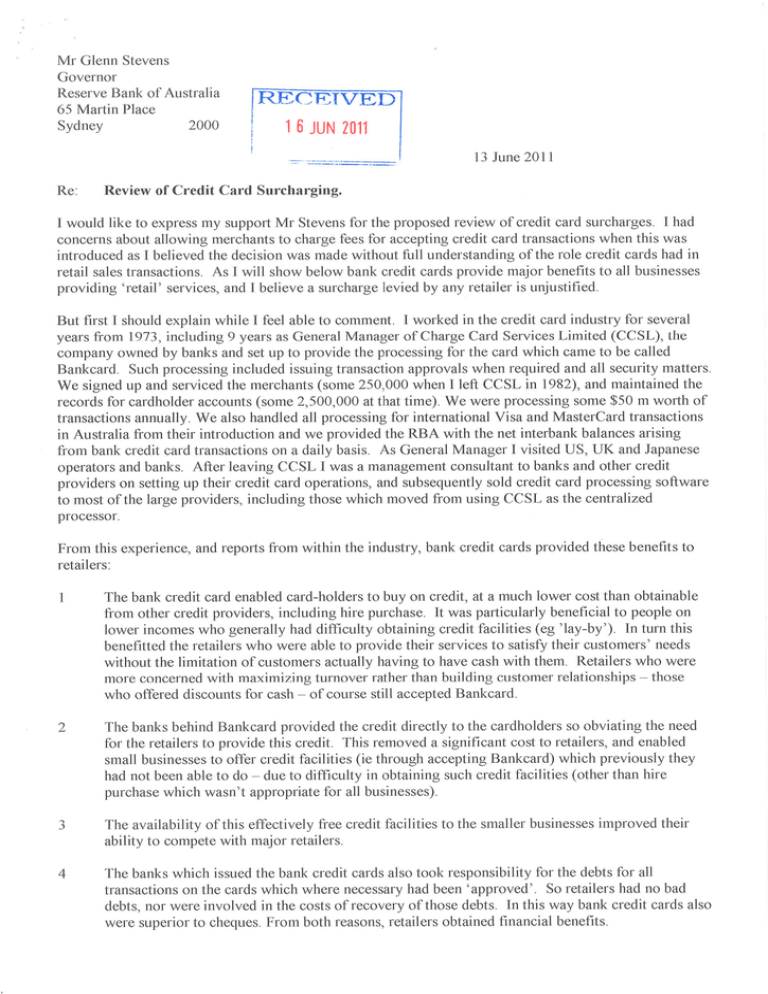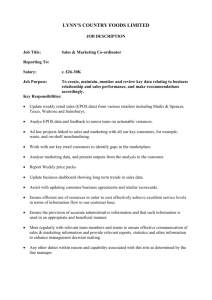ITVEI) Sydney Re:
advertisement

Mr Glenn
Stevens
Governor
Reserve Bank of Australia
65 Maftin Place
2000
Sydney
RFD
ITVEI)
JUN
2011
13 June 20 I I
Re:
Review of Credit Card Surcharging.
Stevens for the proposed review of credit card surcharges. I had
coltcenÌs about allowing merchants to charge fees for accepting credit card transactious when this was
introduced as I believed the decision was made without full understanding oflthe role credit cards had in
retail sales transactions. As t will show below bank creclit cards provide major benefits to all businesses
providing 'retail' services, and I believe a surcharge levied by any retailer is unjustified.
I woulcl like to express my suppoft Mr
But first I should explain while I feel able to comment. I worked in the credit card industry for several
years from 1973, including 9 years as General Manager of Charge Card Services Limited (CCSL), the
company owned by banks and set up to provide the processing for the card which came to be called
Bankcard. Such processing included issuing transaction approvals when required and all security matters.
We signed up and serviced the merchants (some 250,000 when I left CCSL in 1982)" and maintainecl the
records for cardholder accounts (some 2,500,000 at that time). We were processing some $50 m worth of
transactions annually. We also handled all processing for international Visa and MasterCard transactions
in Australia fiom their introduction and we provided the RBA with the net interbank balances arising
from bank credit card transactions on a daily basis. As General Manager t visited US, UK and Japanese
operators and banks. After leaving CCSL I was a management consultant to banks and other credit
providers on setting up their credit card operations, and subsequently sold credit card processittg software
to most of the large providers, including those which moved fì'orn using CCSL as the centralized
processor.
From this experience, and reports from within the industry, bank credit cards provided these benefìts to
retailers:
I
The bank credit card enabled card-holders to buy on credit, at a much lower cost than obtainable
fiom other credit providers, including hire purchase. It was particularly beneflrcial to people on
lower incomes who generally had difhculty obtaining credit facilities (eg 'lay-by'). ln turn this
beneflrtted the retailers who were able to provide their services to satisfy their customers' needs
without the limitation of customers actually having to have cash with thern. Retailers who were
more concerned with maximizing turnover rather than building customer relationships - those
who offered discounts fbr cash - of course still accepted Bankcard.
2
The banks behind Bankcard provided the credit directly to the cardholders so obviating the need
for the retailers to provide this creclit. This removed a significant cost to retailers, ancl enabled
srnall businesses to offer credit facilities (ie through accepting Bankcard) which previously they
had not been able to do - due to difficulty in obtaining such credit facilities (other than hire
purchase which wasn't appropriate for all businesses).
3
The availability of this effectively free credit facilities to the smaller businesses irnproved their
ability to compete with major retailers.
4
The banks which issued the bank credit cards also took respotrsibility for the debts f.or all
transactions on the cards which where necessary had been'approved'. So retailers had no bad
debts" nor were involved in the costs olrecovery of those debts. In this way bank credit cards also
were sLlperior to cheques. From both reasons, retailers obtained financial benefits.
5
l{etailers receivecl cash in their bank acoounts làster than rvhen paynlents rvere made by cheques.
efl'eotivety the day alÌer they hacl clepositecl the merchant copies o1'the paper trans¿rctiotts. When
BIll-POS was introchlcecl the processittg was overnight.
6
The bank creclit carcl vouchers requirecl less manual handling lhan cash trattsactiotts with almost
no human arithmetio errors and greatly reduced opportunities f'or 'sticky f-tttger' employees to
thieve srnall ¿rmounts of cash. EFTPOS further improved this sitr,ration Although not all
providers o1'retail services see ihis as a benefit, the barrk creclit card recorcls reclucecl the
possibilities of tax avoidance
7
Although not so relevant now when bank credit carcl fàcilities ¿ìre almost universal, in the 1'rrst fbw
years afìer Bankcard's introduction, the lfankcarcl logo outside a tnerchaut's premises was a form
of advertising, inviting people to take their custorl there
Altogetlrer these benefits arising fiorn the bank oredit carcl gave retailers signilÌcant oost savings. 'fhe
f-ees charged by their merchant banks were perceivecl as worthwhile by rnost thoughtful retailers. It was
ahvays unfortunate, but a Iàct of'bt¡siness life, that large proviclers of retail servìces rvere able to negotiate
lower 'merchanl service fèes' than small proviclers A fbnn of 'bulk discor-tnt'.
But nowhere is there any justilìcation lor the high level of fees for bank credit card transactions chargecl
by some retailers QAN'IAS being a particularly bad ol'fender in this regarcl.
I trust Mr
1\
Stevens that this inf-orrnation is helpful in your consideratiotrs.
/',
; C.i[ \
\.,
\
David Synttott
,.
*e-->
r,\r r.,-rr,
\









